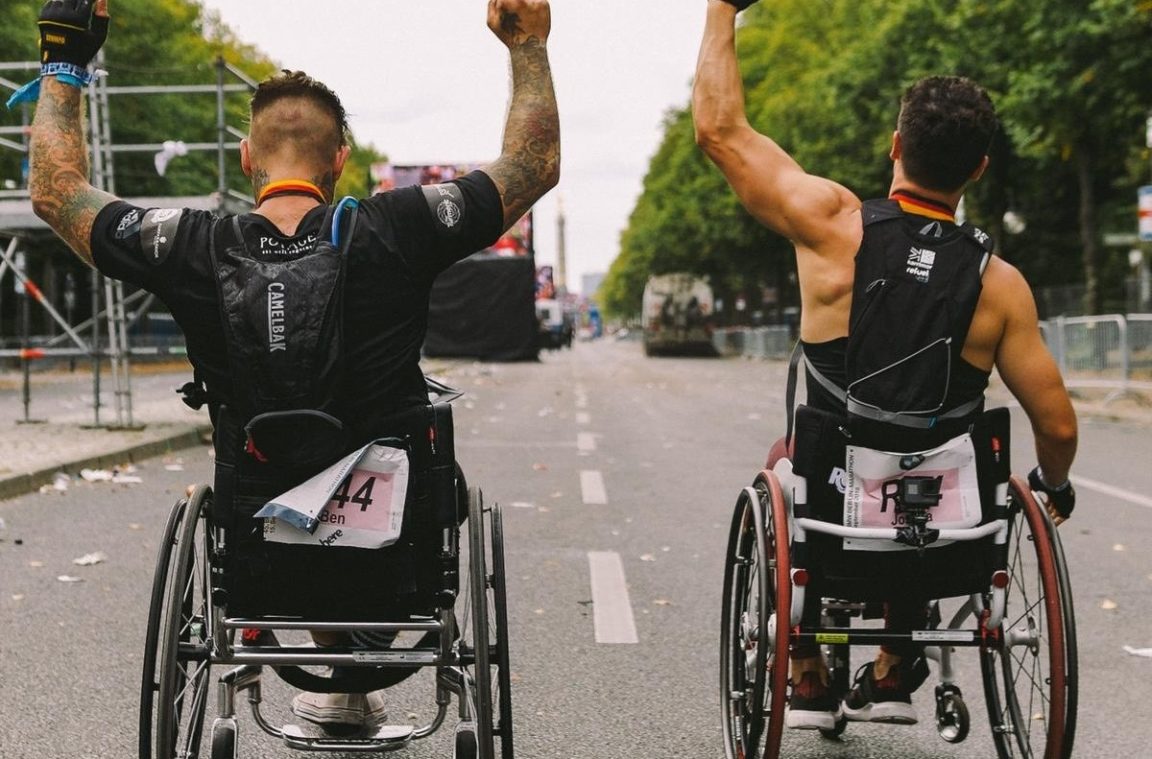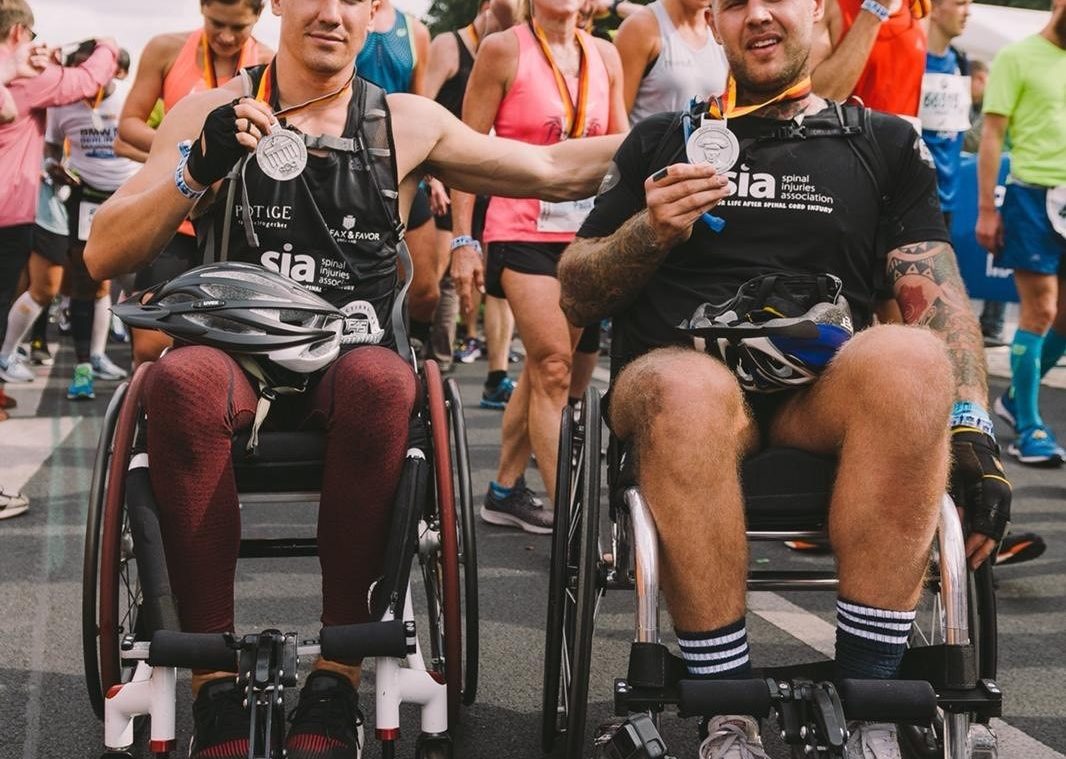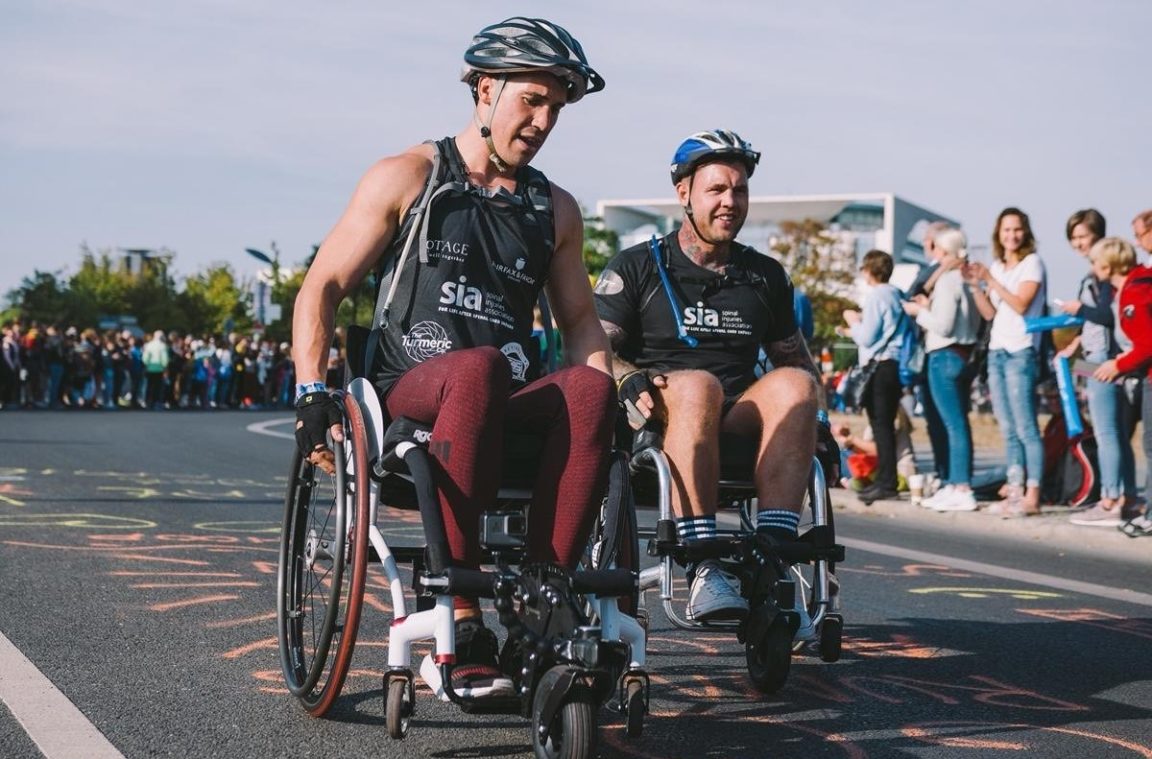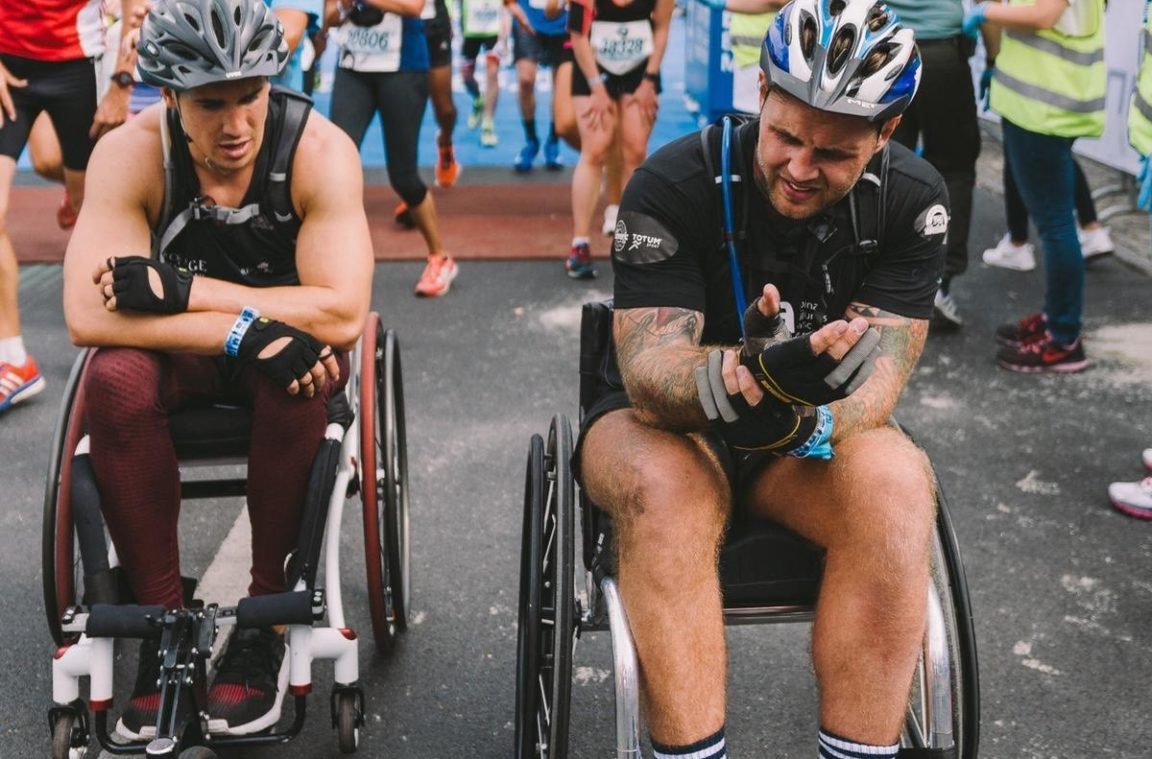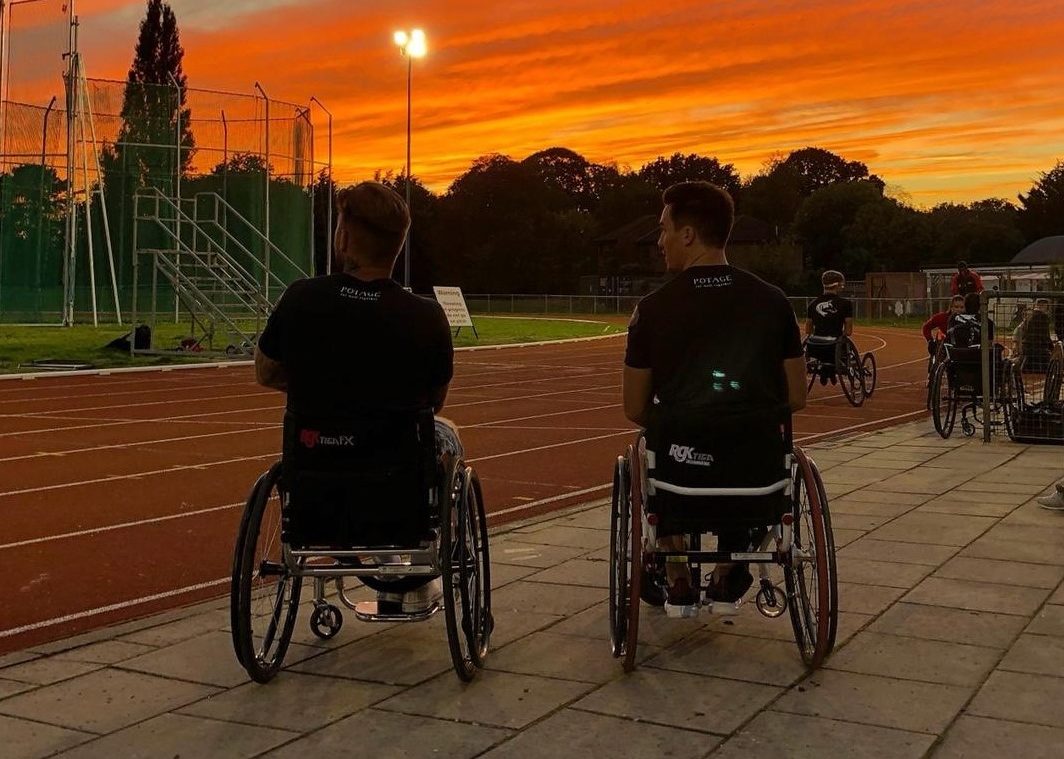On April 23rd to May 11th 2019 Joshua Patterson, best known for appearing in Made In Chelsea, is attempting to set a new male world record time travelling from John-O’-Groats to Land’s End (900 miles) by wheelchair.
In 2017, Josh’s best friend Ben Tansley was involved in a motorcycle accident that left him paralysed from the waist down following visiting Josh and Binky to meet their daughter India when she was first born. During his
Able spoke to Josh and Ben about the upcoming challenge from John-O-Groats to Lands End where they discuss raising awareness and support for those who are in wheelchairs, raising money for the Spinal Injuries Association, Royal Marines and Heads Together, charities that are incredibly close to their hearts.
Why did you choos
Josh: I wanted to set a challenge to prove a point here, that we’re raising money for three charities, SIA – Spinal Injuries Association, which is the charity that supported Ben after his accident, Heads Together, which focuses on mental health, something that I’ve been open about and said that I’ve lived with for a great part of my life and then, the Royal Marines. I think the reality is that it doesn’t matter who you are or what walk of life you’re from, everyone at some point in their life is going to face adversity. And I think being so heavily invested in these three particular communities highlights the amazing values that can be taken from each of them.
From a service point, there are Marines out there who are mentally and physically tougher than most people on this planet, and yet the reality is, post-service, there are individuals, men and women, who are now currently living with a disability, due to casualties in the field. As well as individuals who are now living with mental illness, like PTSD. I think, rather than the individual feeling like life is over, there are qualities, from the other charities, where they can be inspired to see that life is only just beginning.
This challenge, for me, is really embodying all of that. I really want people to take pride and strength in being vulnerable and accepting it. I think it’s a huge part of life and society, that we are trying to cover up. For me doing this challenge, it leaves me incredibly vulnerable as someone that has lived with mental illness and still has his battles. This is a challenge that mentally will push me farther than I’ve ever been before. From a physical point of view, I think a lot of people don’t really understand the magnitude of the challenge or the difficulties of an able-bodied person actually being in the wheelchair. By being in this
When you were asked by Ben to take on the Berlin marathon in a wheelchair, what were your initial thoughts?
Josh: I didn’t really think much about it, to be honest. I just think, you know, my best buddy called me up and asked me to do something with him and one of my sayings is that ‘we’re naïve enough to think that tomorrow is promised’. I think, having been at such a dark point in my life, I really see life as a gift.
I think whenever an opportunity comes up, especially when your best buddy asks you to do it, you’ve got to take them. They’re such wonderful memories and you really don’t know how much time you have on this planet, so make the most of the time that you actually do.
I called up Ben pretty quickly when I started my training and realised what I’d got myself in for, which was a pretty big challenge!
Ben: I think, originally, with the Berlin Marathon, Josh actually thought he was running it! He quickly agreed, and then I was like, “Oh, actually, I want you to do it in a wheelchair with me.” So, the tables really turned quite quickly!
How did you both find taking on the Berlin marathon; did you feel it raised your own awareness of the challenges wheelchair users face from travel arrangements to outdoor sports?
Ben: I think we both had two, individual approaches to it really. I’d recently been paralysed and I wanted to come straight out of
Josh: I think what you see with our Berlin documentary is that from a mental health point what was really interesting is the transition in our journey leading up to the marathon. That, ultimately, I was there really supporting my best friend, but actually, the tables turned when I hit quite a dark point in my life, and this wheelchair, which sounds really strange to individuals, was actually my place of peace; it was my solace. I don’t associate a wheelchair with a disability, it’s become a part of my life and something that I love. It is something that has become so instrumental in enabling me to come over my own hurdles in my mindset.
I learnt a great deal from it but, also, I think the journey leading up to it, it really did subject me to some of the harsh realities that not just Ben, but so many individuals face every single day within the wheelchair. I think, again, that’s why I’ve become so invested within this because we are all equals and we all deserve an accessible life.
Ben: I think it opened us both up to actually seeing what athletes are out there in the world. In terms of the wheelchair community, there are some amazingly talented people. You don’t generally notice at first when you’re able-bodied but there are some tremendous athletes out there.
You recently brought out a documentary on your journey together completing the Berlin marathon, do you feel the documentary will help other wheelchair users to get inspired and take on new challenges?
Ben: Well, I actually have a friend who I met at physio, he’s actually been paralysed for seven years. He’s in his 50s and hasn’t really done much since being paralysed. He was a keen cyclist before, and he’s actually doing the Paris Marathon this year, because of me doing the Berlin Marathon.
Josh: I think the most important thing is to just show Ben’s personality and his attitude to his accident. Although it may appear now to be a rare quality, it’s something that everyone can achieve. I think he’s very lucky that he is a strong individual. His past in boxing has given him that fighting mentality, to not allow himself to give up. I think he’s got a wonderful network of friends and family who have been incredibly supportive. I hope this documentary, can inspire anybody, it doesn’t even have to be someone with a physical disability. The reality is that you all face this adversity at some point in your life, but rather than allowing it to end your life, just believe, like Ben does, that it’s just the beginning.
Ben openly admits that he honestly believes his accident is the greatest gift that he’s been given. The things that he’s achieving, and the people’s lives that he’s touching, he never would have done before. I think it gives you a greater appreciation of the life that you have. I think we just wake up every day, and it resonates within the documentary, just how much we are grateful for life and how many people we want to help.
Would you be able to go through some of the workouts that you had to undergo in the build-up to your challenge? Are there any top tips you can give to build both physical and mental strength?
Ben: I think, in my first year of being paralysed, I came out and wanted to try everything. I think my first year paralysed, I’d probably done more than most. And I fell in love with kayaking, actually, during my training for the Berlin Marathon, I did a hell of a lot more kayaking than I did pushing, which turns out to not be the best advice. But I think the main thing is just to go out and try new things.
I think people are a hell of a lot stronger than they actually realise they are. You can sometimes stew at home thinking and over-thinking about things you’d like to try and do. I think with anything, it’s just then trying and doing it. The only difference is how long it takes to get there. Most people pull through it and they find sports and things they love. It just takes time. I think, a lot of people, once they try it, they regret not trying things sooner. So, I would just say go out and try things, and just see what you can do.
Josh: I think my advice would be, if you do anything in life, or if you’re going to set yourself up for a marathon, just make sure that the fundamental inspiration behind it really resonates with you and has that impact. For me, knowing that I’m doing this for my best mate, and the charities that have helped him after his accident, there was no doubt in my mind, whether we trained or not, that we were going to cross that line together. It just made the whole experience incredibly special. I’m just so grateful that I was able to be a part of this with him.
In terms of the training, I think it’s so important for you to make sure that you can continue to do your training in the chair, try and get outside as much as possible. I think when the weather’s nice if you can get yourself out to any form of
I think that’s what we’re really trying to achieve right now, is just building that awareness so that any man, woman or child can know whether there is a coach or an academy somewhere near them. I think the issue right now is that there are a lot of individuals out there that don’t necessarily know about
Ben: I think that’s the great thing about social media, where there is a great community of people. It shows that even to the greatest athletes in wheelchairs, they are only a message away. I’ve found, so far, no matter who I’ve messaged for advice, everybody is keen to help. I think when you’ve been through something traumatic yourself, you can relate to people that have been too, everyone’s so helpful. There is a great community of people out there.
I know with your upcoming challenge, you’re looking to set a new world record. What’s your ultimate goal? Are you feeling positive and confident about reaching it?
Josh: This is the first time that I’m going into a challenge where I can honestly say I have no idea what the outcome is. And that’s the first time I’ve ever said that. Normally, I go into it and I’m confident I’ll win, or I’ll achieve what I set out to do. I don’t think people understand the magnitude of this challenge. The benchmark right now is 19 days, and in order to achieve that, there
I want people to see the vulnerability, with individuals that have
This is quite a big statement that we’re making here. This is more than just me being in a wheelchair, trying to break
Ben: I don’t think people understand that just because Josh is able-bodied it won’t be an easy challenge using a racing wheelchair for 19 days straight. I personally can’t even get in a racing wheelchair because of
Josh: I want people to be invested in this as much as I am. Now I’ve had an insight into it, and a taste for it, I am so excited by so many of the different sports within the Paralympic Games. It’s all thanks to Ben, really. I want people to watch things like the Paralympic Games and thoroughly enjoy it, and not see it as a side-sport. These individuals, what they do every day is incredible.
The average speed I go at in this wheelchair in terms of my ultimate speed, I’d say is around 11-miles-an-hour. David Weir’s minimum is, 15/16-miles-an-hour, and he goes as fast as 25-miles-an-hour. I think people just assume because I can walk, that it’s a breeze in the park me getting into this chair. Actually, it’s the furthest thing from it. I think it’s people’s naivety and ignorance that we’re trying to correct here. I’m just really going out there with my best mate, and we’re trying to deliver a message. Hopefully, slowly, people will listen and we can start to make a change and make people feel more welcome.
Ben: I was one of those people at the start. When I’d been paralysed about three days and I came out of the operation I said to my dad, “I’m going to be a Paralympian, don’t worry.” I just figured that, because I’d been so sporty before, I was going to get in this wheelchair and actually be one of the best people in a wheelchair. Now I’m actually in it and you’re looking around there are some tremendous people out there. I was very naïve to it myself early on, to think I was just going to get in a wheelchair and break records. The reality is there are some amazing people out there doing some amazing things.
What do you feel will be most challenging about your upcoming record attempt? Can you take us through how the challenge will work from start to finish?
Josh: We really want to be inclusive here. The plan over the 19 days, (if that’s what we’re able to achieve it in) is we’re going to be having individuals joining me on various legs. I would love to try and dedicate each day that we race to one individual. Either an individual who is living with mental illness or
The preparation really is about the people that I will be able to do this alongside. Ben is going to be coming out and joining me on several legs, fitness permitted. The game plan is just me being in the chair as much as I can and just breaking my body down and adapting to the chair as much as I can. I think just waking up every day and knowing that there’s an individual’s name that we need to mention at the start of the day, and there’s an individual that will come and join us, I think that’s going to be, the biggest inspiration behind trying to achieve this.
I’ve looked at your YouTube documentary series, Limitless, and I understand it’s helping to showcase the power of the mind and change how we see ourselves. Do you feel the series will help others who are struggling in the face of adversity? Is that your main goal with the series, that you’re focusing on?
Josh: Yes. Ben’s been featured in this year’s series. It focuses on one individual from any walk of life; it doesn’t matter whether you’re black, white, straight, gay, rich, poor – adversity will come for you. I think, rather than accepting the fate that you’re sometimes given, you need to understand that there is always that opportunity of beating it; always. I think the individuals that we’ve filmed with, you get to see some of the adversity these guys face and how statistics are constantly thrown at them, they’re constantly told that they can or can’t do something. Instead, they take it into their own hands, and they beat the odds, and they become the new statistic.
I think that’s what I really want to inspire, alongside Ben with his attitude, is that any mindset has that capability; that when you’re told you can’t do something, I promise you, if you want it enough, you really can. I think that’s why having Ben be a part of this is so
Do you have any upcoming challenges, Ben, that you’d like to talk about?
Ben: I’ve got a big one I’m trying to make happen towards the end of the year. There’s a big set of stairs in China called Heaven’s Gate, it’s about 999 steps from the bottom to the top. The plan is for Josh to carry my legs and I’m going to go
Joshua Patterson will attempt to set a new World Record travelling from John O Groats to Land’s End by manual wheelchair in 19 days from April 23rd 2019.
For more information and to donate head
